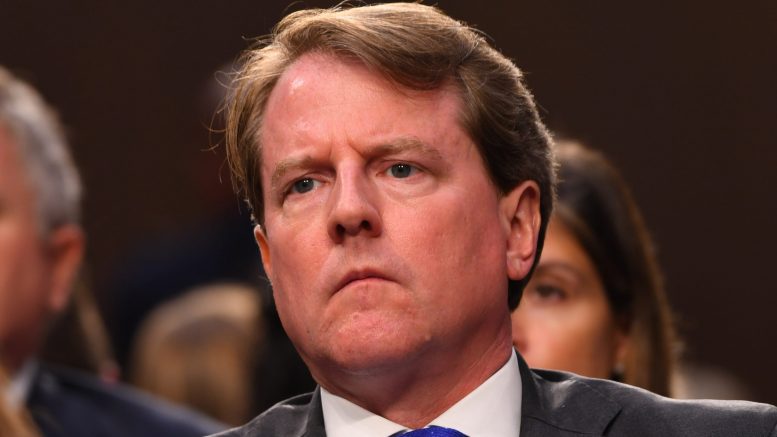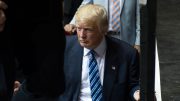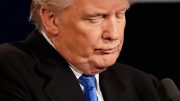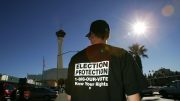WASHINGTON — The House Judiciary Committee asked a federal court Wednesday to force President Donald Trump’s former White House counsel, Donald McGahn, to testify before lawmakers who are weighing whether the president should be impeached.
In a lawsuit filed in federal court in Washington, the House panel made explicit that it is trying to determine “whether to recommend articles of impeachment” against Trump. The Democratic-controlled panel said it needs McGahn to testify about episodes of possible obstruction of justice outlined by special counsel Robert Mueller’s investigation of Russian interference in the 2016 election.
“But it cannot fulfill this most solemn constitutional responsibility without hearing testimony from a crucial witness to these events,” the complaint says.
McGahn defied the panel’s subpoena in May at the request of White House lawyers, who argued that presidential advisers have an absolute immunity from testifying before Congress. A U.S. District Court ruled in 2008 that presidential advisers weren’t entitled to absolute immunity, but the White House and Congress settled the case before an appeals decision was reached.
Judiciary Chairman Jerry Nadler, D-N.Y., has dismissed absolute immunity as nonsense. Nadler has said that if the federal courts uphold the subpoena, it could open the door to information from other former White House aides. McGahn described incidents of potential obstruction of justice by Trump in trying to remove Mueller from the investigation, according to Mueller’s report.
“The excuses that the White House gives for McGahn not testifying – the nonsense about absolute immunity etc. – are the same excuses for all the other fact witnesses,” Nadler said July 24, at a news conference after seven hours of hearings with Mueller. “If we break that, we will break the logjam.”
Other than Trump himself, McGahn is “the most important witness” to the key events the committee is investigating, the complaint says.
“Notwithstanding the President’s broad declaration of his intent to defy all subpoenas — and his purported direction that McGahn defy this one — the Judiciary Committee has made ever effort at accommodation to avoid the need for this litigation,” the complaint says.
McGahn’s attorney, William Burck, was not immediately available for comment.
Trump has called the Mueller inquiry a witch hunt and argued that continuing investigations into the administration are partisan harassment rather than legitimate congressional oversight.
The McGahn case represents the latest in a variety of legal challenges pending between Congress and the executive branch. The Judiciary Committee held Attorney General William Barr in contempt for refusing to provide an unredacted version of Mueller’s report, and the full House found Barr and Commerce Secretary Wilbur Ross in contempt for refusing to provide documents about a citizenship question for the census.
Other House panels have won court rulings for access to Trump’s personal financial documents, but the president has appealed those rulings. The Judiciary Committee filed a lawsuit on July 26 seeking access to grand-jury evidence supporting the Mueller report, which Barr blacked out in the version he provided Congress. And the panel continues to press Trump aides and associates with subpoenas.
Trump allowed McGahn to meet with investigators for 30 hours during the nearly two-year inquiry. Trump now contends any documents McGahn could provide the committee are White House property and should remain confidential.
Democrats have focused on the 10 episodes of potential obstruction of justice detailed in Mueller’s report, including efforts to fire the special counsel.
Trump called McGahn at home June 17, 2017, and told him Mueller had conflicts and should be removed, according to the Mueller report. Rather than carry out the order, McGahn decided that he would resign rather than trigger what he regarded as a potential Saturday Night Massacre, a reference to former President Richard Nixon firing prosecutors during the Watergate investigation. Trump later met with McGahn in the Oval Office and pressured him again, but McGahn refused.
McGahn later told Trump’s chief of staff that the president had asked him to “do crazy s—,” according to the report.
On Jan. 25, 2018, after news broke about Trump’s efforts to have Mueller fired, the president told White House staffers to tell McGahn to dispute the story and create a record stating he had not been ordered to remove Mueller. McGahn refused, according to the report, and told investigators the media reports were accurate.
Nadler argued in a May 7 letter to McGahn’s lawyer that Trump already waived executive privilege over documents by providing them to Mueller’s team. Even if privilege is asserted, Nadler said McGahn would have to appear and assert it for each question asked.
But Burck replied in a letter to Nadler that said McGahn would wait while the committee and the White House negotiate what to do with the records.
“Where co-equal branches of government are making contradictory demands on Mr. McGahn concerning the same set of documents, the appropriate response for Mr. McGahn is to maintain the status quo unless and until the committee and the executive branch can reach an accommodation,” the letter said.
Source: www.usatoday.com




